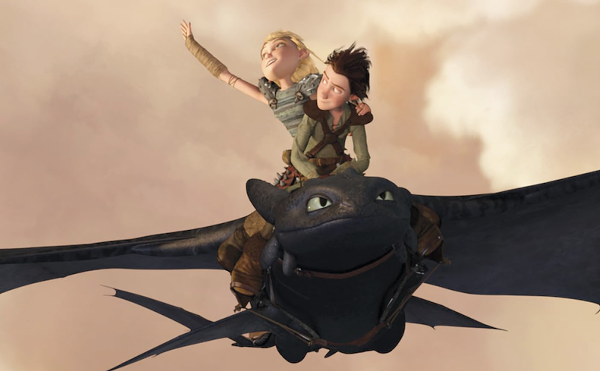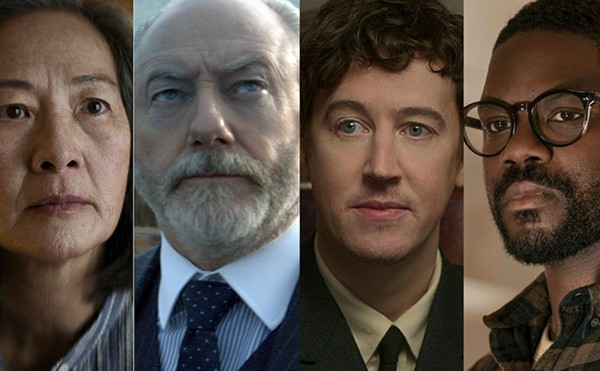SPOILER WARNING: Don’t get too attached to Robert Patrick in this one. Just sayin’. Poor bastard doesn’t even get a credit, far as I can tell.
Upon reading the synopsis for We Are Marshall, I gave a silent, inward sigh. All right, I thought resignedly. Yet another entrant in the swelling parade of passable, PG-rated, ’60s- and/or ’70s-set sports-as-metaphor/ redeemer/vehicle-for-social-change dramas, whose only truly outstanding quality is the shared freedom to produce the trusty, “Based on a True Story” card at any moment (and run a “Where Are They Now?” montage segment over the closing credits). Another Little Star That Sort-Of-Almost Could added to the dim constellation inhabited by such disappointing or fine-but-forgettable offerings as Glory Road, Remember the Titans, and Invincible. Sigh. I wasn’t hopeful, and the Joseph McGinty Nichol (aka McG) director credit seemed filled with ominous portent — and, to be frank, felt garishly out of place in a film calling more for, let’s say, subtlety and sensitivity than a boundless penchant for wire stunts.
Well, pick up your egg-hued crayon and color me humbled. (Aim for the face.)
In November 14, 1970, the football team of Huntington, West Virginia’s Marshall University was flying back from a 17-14 loss at East Carolina University. Onboard with them were a full staff of coaches, more than 20 boosters and fans, and a four-person flight crew — 75 people in all. About an hour after takeoff, the plane crashed into the side of a hill, killing every passenger and leaving in its wake an anguished town, forced to rebuild despite the loss of far too many irreplaceable pieces.
From the first understated frames of We Are Marshall, it’s clear that significant artistic effort has been expended here, and the film, naturally, is all the better for it. The shots are elegant and inventive, the editing is generally imperceptible (which is a very good thing, when it comes to editing), and, on occasion, breathtakingly surehanded: The crash scene, in particular, rightfully eschews spectacle in favor of artful suggestion, but is no less harrowing — and in many ways more effective — than would’ve been a less tasteful or more overt approach. Cheers, then, to director McG (still feels mildly surreal to write that), and to editors Gregg London and Priscilla Nedd-Friendly.
Also working in WAM’s favor is an engaging, surprisingly deep cast — not always the case in sports-heavy films. The most is asked, emotionally speaking, of Matthew Fox (LOST, Party of Five) and the rising, talented Anthony Mackie (Half Nelson, Million Dollar Baby, She Hate Me; recently selected for Nat Turner and Jesse Owens biopics), as an assistant coach and surviving player, respectively. Both deliver admirably. Ian McShane and another young star-in-the-making, the lovely (and somehow, mildly Julia Roberts-ish) Kate Mara (Brokeback Mountain), fill out vital supporting roles nicely. David Straithairn’s bookish university president is, predictably, top-notch. But much, of courses, hinge on the performance of Matthew McCon-aughey as new coach Jack Lengyel, charged with reinvigorating a decimated and deeply wounded team. At first, it’s a bit of a hard sell. McConaughey’s Lengyel, once we get to know him a bit, is pushy, twitchy and, truth be told, a bit of a nutcase. He talks out the corner of his mouth and makes too-generous use of the politician thumb-point; he’s cartoonish, a seeming hybrid impression of George W. Bush, Jon Stewart, and a slightly more focused and responsible model of McConaughey’s sex-predator-lite Dazed and Confused incarnation, David Wooderson. Admittedly, that sounds overwhelmingly strange, which is why it takes some getting used to. He commits, though, and by the end, you believe him, and have even grown to like the character. That, and you really want to meet the real Lengyel, who must be either (A) an enormously entertaining eccentric, or (B) about to sue the shit out of Matthew McConaughey.
There really is very little wrong with We Are Marshall. Much, on the other hand, is done right. It deftly negotiates a sports-cliché minefield — visual, thematic, and otherwise — to churn out precarious scenes with confidence and skill. Even the pivotal, last-second Hail Mary touchdown try, perhaps the most well-tread football-flick element of all, is rendered more effective than any in recent memory thanks to an inspired editing tweak. Director McG, it must be said, exhibits revelatory craftsmanship, considering his Charlie’s Angels pedigree. Ultimately, WAM will likely fade from memory sooner rather than later, as sports-centric films are generally wont to do, but that doesn’t diminish the fact that it’s worlds better than I expected: funny, affecting, beautifully photographed, and persistently, refreshingly good.
















